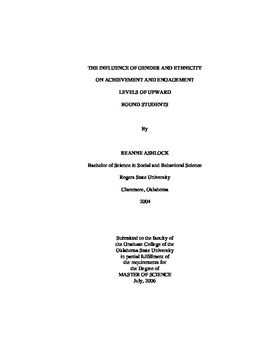| dc.contributor.advisor | Montgomery, Diane M. | |
| dc.contributor.author | Ashlock, ReAnne M. | |
| dc.date.accessioned | 2014-04-16T03:11:23Z | |
| dc.date.available | 2014-04-16T03:11:23Z | |
| dc.date.issued | 2006-07-01 | |
| dc.identifier.uri | https://hdl.handle.net/11244/9727 | |
| dc.description.abstract | This study examined the relationship between the ethnicity and gender of UB students in relation to their engagement and achievement. The engagement of participants in relation to their academic achievement was also reviewed. The data was collected from the files of 203 former and current participants of a UB program located in northeastern Oklahoma. A dual measure was used to measure achievement. A combination of the students' GPA and their scores on an achievement test known as the Test of Adults Basic Education (TABE) made up the achievement variable. Engagement was calculated by determining the total number of activities a student participated in and dividing that by the actual number of chances they had to participate. A significant correlation was found between engagement in UB and achievement. However, the correlation was weak. ANOVA analysis revealed that no significant differences existed between achievement and gender and ethnicity or between achievement and gender. However, significant differences were found between achievement and ethnicity. Post hoc tests revealed that the differences existed in the achievement scores of African Americans and Caucasians and between African Americans and Native/Hispanic Americans. In both cases African Americans scored lower on the achievement measure. No significant results were found in the analysis of engagement in relation to gender and ethnicity. The results confirmed a relationship between engagement in the UB program and academic achievement, however, the weak correlation suggests the need for future studies to confirm this relationship. Since the program is formatted around improving achievement through engagement in pre-designed activities, understanding the ability of these activities to engage the students and ultimately improve achievement is extremely important for maintaining and improving program effectiveness. The low sample size in this study could have affected the strength of the correlation found, and should be increased in subsequent research. The relationship between achievement and ethnicity, in which African Americans are scoring low in comparison with the other groups in the program, suggests the need for future analyses as well as program reform aimed at improving the achievement levels of this group. | |
| dc.format | application/pdf | |
| dc.language | en_US | |
| dc.publisher | Oklahoma State University | |
| dc.rights | Copyright is held by the author who has granted the Oklahoma State University Library the non-exclusive right to share this material in its institutional repository. Contact Digital Library Services at lib-dls@okstate.edu or 405-744-9161 for the permission policy on the use, reproduction or distribution of this material. | |
| dc.title | Influence of Gender and Ethnicity on Achievement and Engagement Levels of Upward Bound Students | |
| dc.type | text | |
| dc.contributor.committeeMember | Bull, Kay | |
| dc.contributor.committeeMember | Hull, Deborah | |
| osu.filename | Ashlock_okstate_0664M_1969.pdf | |
| osu.college | Education | |
| osu.accesstype | Open Access | |
| dc.description.department | School of Teaching and Curriculum Leadership | |
| dc.type.genre | Thesis | |
